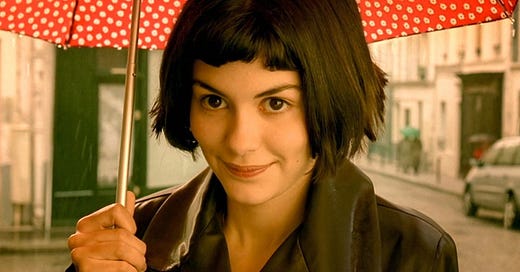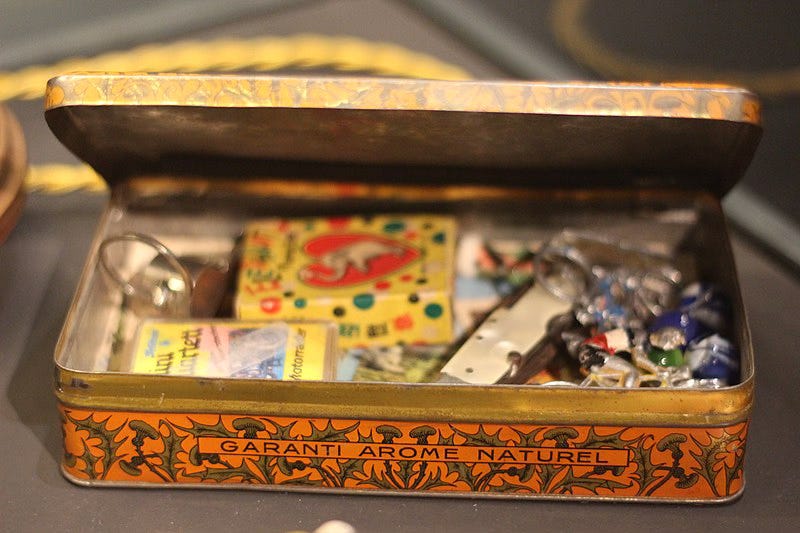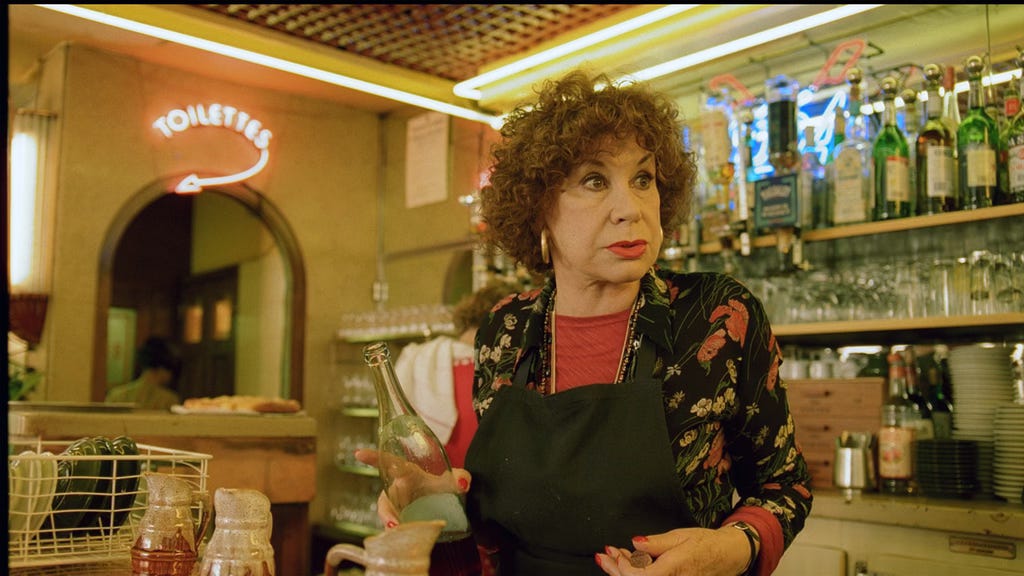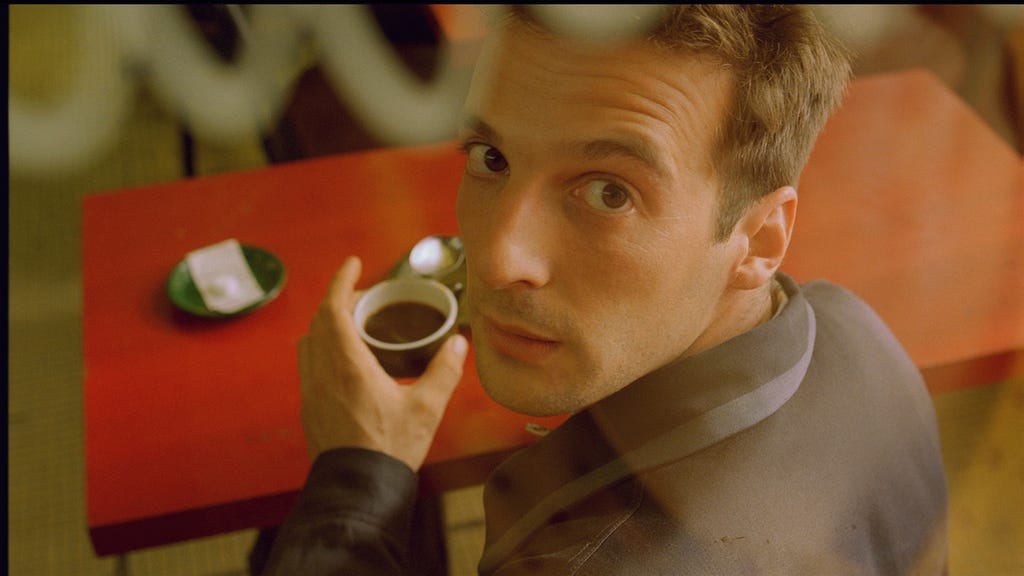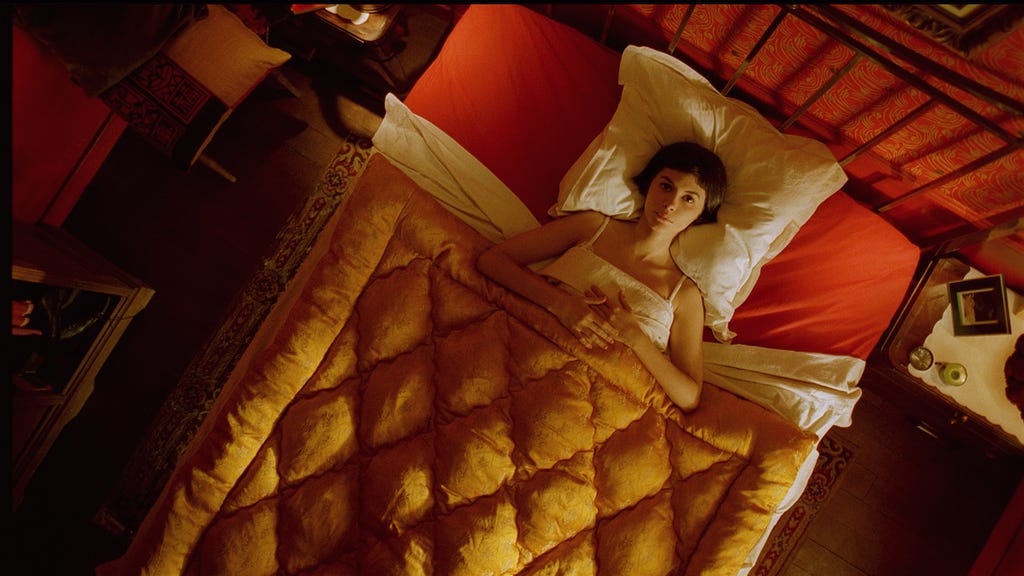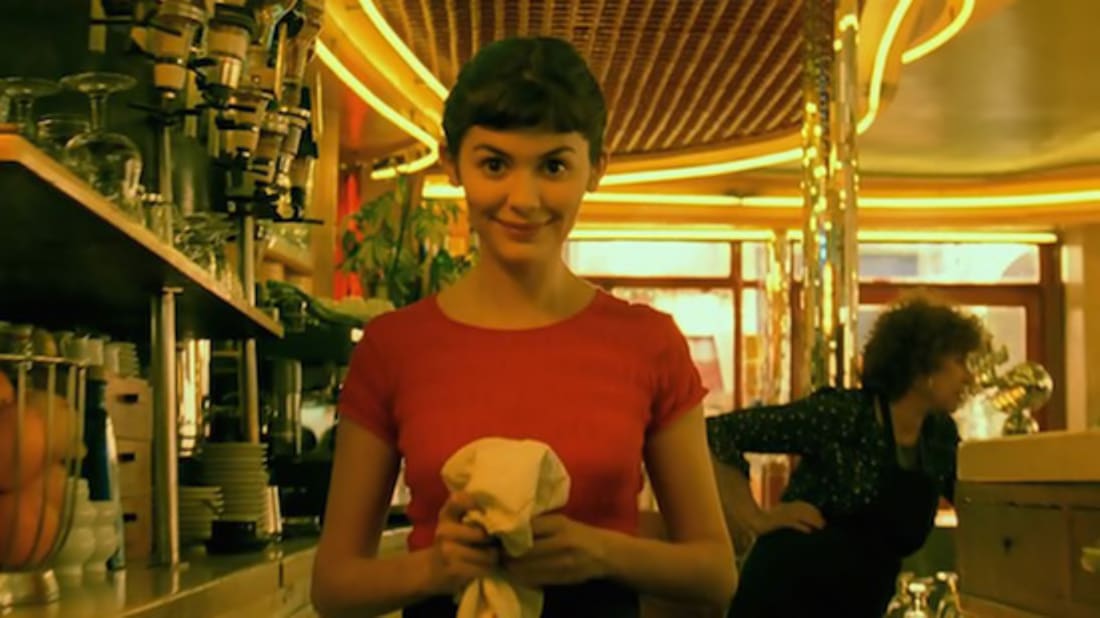Jean-Pierre Jeunet On Amélie
An interview after its 2001 North American premiere the night before 9/11
A digital restoration of Amélie opens in the U. S. on Valentine’s Day 2024. This text is an accumulation of a couple of interviews and contemporary reviews from 2001, including a Filmmaker magazine cover story, edited by Scott Macaulay.
It's not love, just movie love, but it's adorable.
Jean-Pierre Jeunet's breathlessly entertaining Amélie, coming off of years of inventive, if dour fairytales made in collaboration with Marc Caro, is a movie about mischief and bliss that's was described by a few as too sweet, too nice, too eager to please, as if a puppy had just pissed in their lap.
That's the age. Joy is suspect. Bliss? Mere "entertainment."
Jeunet made the grim Alien Resurrection for an American studio, then returned to France to work on a lighter notion, a gesture of independence against Hollywood, his creative partner and contemporary French cinema. The result has broken box-office records in France, sparked conversation and even a modest backlash—denied a slot in Cannes, Amélie was offered an open-air screening.
"Why should I show my film in a parking lot when it belongs in a cinema?" the forty-seven-year-old writer-director asked in demurral. Le Fabuleux Destin d'Amélie Poulin or Amélie, as it has been shortened for North American consumption, is expected to be a rare arthouse home run here. On his now-defunct website, Jeunet asserted after test screenings in New Jersey, that Miramax will consider any returns under $25 million a failure. (Its final worldwide theatrical gross rose to $174 million, of which $33 million was from the U. S.)
Before its public debut at the ornate Elgin Theatre at the Toronto International Film Festival, on the night of September 10, 2001, Jeunet and I are introduced. "No, no answers!" the shaven-headed, Tintin-shirt-wearing director jokes. Like the most simple-minded of press questioners, I reply, "Monsieur Jeunet: expliquez!"
"No, no, it's all a mistake," he says, grinning, "Everything is a mistake."
A naive young gamine seeks love in the city of light: there's little more you should know before taking this zoomy ride, and reviews will be certain to spoil the better giggles and tremors for you. Let's just say Jeunet's fourth feature is a portmanteau agglomeration, a summary of narrative and fate, joy and despair and more joy. It's filled with shivers, frissons of simple play atop a network of cultural and historical references. Some give off little explosions to a French audience alone, others are embedded in the collective consciousness of western pop culture. As swoony-spasmodic as Truffaut's Shoot the Piano Player; as quartier-specific as the films of Prevert or Carne or even Melville; as forgivingly elastic of space as the films of Jacques Tati (the title Playtime could suit Jeunet's film as well); the list-making of Trainspotting; Peter Greenaway's jam-stuffed frames, but with a sense of humor; roguish pets with anthropomorphic longings out of Tex Avery; a box of long-lost boy's toys precipitating a cascade of nostalgia, as in Nicholas Ray's The Lusty Men. The comics of Jacques Tardi. See: another list.
What about the bliss?
it's almost impossible to write well about bliss. Longing, yes, regret, yes. Ugly souls and bad men are joyful to describe or for actors to play, a sweet sin to write about. But what about rapture, tranquillity, the contentment we all seek? Happiness writes white, goes the phrase by author Henri de Montherlant.
"You are going to see a very nice Paris in my film," Jeunet told his first North American audience. "Believe me, it is raining every day, we have traffic jams in the street, there is shit everywhere. I warn you if you are going on vacation!"
Our extended interview was scheduled for later that week, but most events were canceled after September 11. David Lynch was trying to rent a bust to get he and his cast back to America. Jeunet still wanted to talk a couple days later, when few others did, and we met at the headquarters Hyatt hotel.
People seem afraid of making movies that are sheerly joyous, mischievous yet affirmative. Why was it important to make a joyous film at this time in your life or your career? It's not the easiest thing in the world. Happiness writes white, goes the phrase.
Jeunet looks to his translator with a grin.
This guy is crazy!
He pauses, playing amused.
Maybe it's because I did three dark features? When I worked with Caro, it was different. You have to have something to interest you in [all the work that goes into making] a film. But we are not brothers, we are not lovers. It is difficult to get the [shared] emotion. He doesn't like sentimental things. The City of Lost Children, yes, is a dark film, and probably darker than most people imagine. It has taken me a long time to realize just how dark it is. And after Alien, I realized that I had never made a truly positive film. This was of interest to me: to build rather than destroy presented me with a new, interesting challenge. I wanted to make a sweet film at this point in my career and my life, to see if I could make people dream, and give them pleasure. This is my personal film, one I dreamed of for a long time.
The film is often a barrage of notions, like channel zapping. So you've got a film informed by forty-seven years of images and ideas, trying to turn scraps into a scrapbook of memory. Did that form suggest itself before the characters and their overlapping desires?
I'm crazy because I could have made five films. Now I am dry. I should have made five movies instead! I'm kidding! I did collect these ideas for twenty-five years. So now I have one story with 200 stories, the reverse of what you learn in school. [laughs] It's all a mistake!
It must have been a long process of writing and storyboarding as well as editing to get those bits to all mesh.
I did eighteen drafts and a storyboard. But it's not work, it's pleasure.
I've read you say that your sensibility lies between Tex Avery and Marcel Carne.
Do you love Carne? Movies like Le Quai des brumes [Port of Shadows], Le jour se lève. I love those films. It is an era of French filmmaking that matters.
That brings up the whole idea of typage, the wonderful, expressive features of actors from that era: do faces and casting define the world of a film?
Today I tried to find some French faces, faces like Michel Simon, Carotte, Jean Gabin, the ones you see in films like those of Carne. It is not easy anymore. These are actors who had strange faces, but they knew how to play on screen. This was all before the nouvelle vague, after the nouvelle vague, everything had to be "realistic," but I hate that. I am always searching. My grocery man [in Amélie], I found him for a commercial. But about Tex Avery, I had a passion for Tex Avery, but long ago. I began by writing about animation, I was a critic of animation, but I lost interest in all that after making my own shorts. There is only one shot in the film I have literally quoted Tex Avery, you can see it in a shot where an enormous amount of water falls.
While you were working with exteriors for the first time, the extensive post-production still "interiorizes" it all in a way.
I try to work outside like on a stage. We modified a lot of the reality. But it was important that it take place in the Paris of today, and not be in some kind of timeless dimension. For example, we changed things on the wall, got rid of graffiti, added signs. We made sure there were modern objects, ugly things in the corner of rooms. And then in post-production, if we did not like a face in one corner, "Bye-bye people."
Again, the idea of every frame like a painting.
Yes. I hate white skies.
But you can admire other filmmakers for capturing the modern world?
Yes, certainly, I appreciate realism. Erin Brockovich, that is not my style, but that is a wonderful film.
How do you feel when other filmmakers pluck details from your films? "Homage" can be such a fancy word for stealing.
Jeunet widens his eyes, smiles.
Ah! Ah. I have a good example. There is a director, called Tarsem. He did The Cell. Before that, he did lots of commercials that looked like Delicatessen, especially one British beer commercial. It must be sad, working only with the ideas of other people instead of your own.
Do you know the bookstore in West Hollywood, Book Soup? You can see assistants piling up art books, photo books there, for their bosses to rip pages out and pin them to the wall for inspiration.
Yes, but Book Soup! In Los Angeles, it alone is a place to go to see people!
The voice-over is breathless and breaks a few rules of its own. The audience I saw it with was laughing at everything you threw at them.
One advantage is that you can get through small details very quickly. When I was in the editing room, I was a bit worried twenty minutes in. That is why, fter ten minutes, we see Amélie in the cafe, and the voice-over says, "The story will begin in a little bit." Don't leave! Don't go away!
Have you watched the movie with a lot of audiences? That standing ovation was pretty breathtaking at the first public screening here in Toronto.
I saw the film at lot of times in France, and at the Edinburgh festival. The other night, I meant to slip out after a few minutes, but I couldn't. After that audience, I was ready to sign my next three films up for Toronto.
I can't imagine Emily Watson in the role instead of Audrey Tautou.
Jeunet shrugs.
No, no. It's just a little more French, a young girl. You've seen Breaking the Waves. Emily Watson could be Amélie. It would be the same film. Only a different face.
This must have been on your mind a long time, it's not like this was a reaction to the scale or style of Alien Resurrection.
I was already working on what would become Amélie. I didn't know what the film was about, but I had plenty of ideas for scenes, situations, characters, many specifics. One day, it was clear. A girl decides to alter the shape of the lives of other people. That was all I needed.
So the film is a big collection of things. And Amélie loves lists and the voice-over shares the likes and dislikes of several characters. So you—
I love lists, I love collections! You have it right, I collect themes! I used a few of them in the film, Nino (Mathieu Kassovitz) collecting concrete footprints or the torn photobooth strips. I used to have a box where I kept my story fragments. Now I store all the ideas and lists in my computer. But using the lists, it's a delicate matter. They have to reflect the personal yet they must reflect things everyone shares.
Amélie says, "I like noticing the details that no one else does." And the movie is filled with opportunities, bursting with things. It's a better use of digital technology than science fiction, adding little things to the frame like that one perfect shot of a jet in the corner of a skyline early on.
That was just a lucky day.
Back to comics. You're obviously immersed in the French style of comics, to use Jacques Tardi as a single example. There's a perfectionism to every frame he draws, part reportage and part a beautiful world that reflects his fascinations.
We are friends. We speak a lot. We have the same passion for the imagery of the first World War. I would return from a location I had chosen around Paris and I would look at the photographs and I would say, "Where have I seen this before?" And I realized, Tardi had already drawn it!
I don't think anyone's ever made an I-love-New-York movie with as many locations as you have of Paris, eighty or so?
I wanted Paris to be there at the heart of the film. It's Kurosawa who said that "Every shot should be like a painting," and I agree with that. Like Tardi, I am drawn to particular staircases, monuments, the elevated Metro trains. We start there, then clear the streets of cars, graffiti, make the city more esthetic. then, down to the final frame, digital post-production let us work on creating this Paris to the last moment.
So did that ease the pressure on you, knowing you could make changes after principal photography?
I can't get used to the idea that I can't control everything. Location work, there's always something going wrong, and it makes me crazy, a car parked in the wrong place, someone making noise. I prepare extensively so that I don't waste time, so when we lose an hour or two because of things we have not foreseen, I am not amused.
